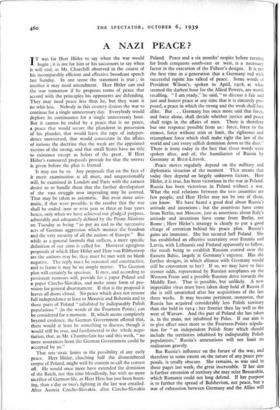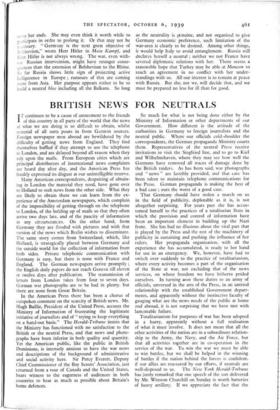A NAZI PEACE ?
IT was for Herr Hitler to say when the war would begin ; it is not for him or his successors to say when it will end, as Mr. Churchill observed in the course of his incomparably efficient and effective broadcast speech last Sunday. In one sense the statement is true ; in another it may need amendment. Herr Hitler can end the war tomorrow if he proposes terms of peace that accord with the principles his opponents are defending. They may need peace less than he, but they want it no whit less. Nobody in this country desires the war to continue for a single unnecessary day. Everybody would deplore its continuance for a single unnecessary• hour. But it cannot be ended by a peace that is no peace, a peace that would secure the plunderer in possession of his plunder, that would leave the rape of indepen- dence unreversed, that would consecrate in the affairs of nations the doctrine that the weak are the appointed victims of the strong, and that small States have no title to existence except as helots of the great. If Herr Hitler's rumoured proposals provide for that the answer is given before the plan is framed.
It may not be so. Any proposals that on the face of it merit examination at all must, and unquestionably will, be examined in London and Paris with the earnest desire so to handle them that the further development of the vast struggle now impending may be averted. That may be taken as axiomatic. But even more axio- matic, if that were possible, is the resolve that the war shall be ended, now or next year or• three or four years hence, only when we have achieved our pledged purpose, admirably and adequately defined by the Prime Minister on Tuesday as being " to put an end to the successive acts of German aggression which menace the freedom and the very security of all the nations of Europe." But while as a general formula that suffices, a more specific definition of our aims is called for. However egregious proposals of which Herr Hitler and Herr von Ribbentrop are the authors may be, they must be met with no blank negative. The reply must be reasoned and constructive, and to frame it may be no simple matter. The German plan will certainly be specious. It may, and according to persistent rumours will, provide for a paper Poland and a paper Czecho-Slovakia, and make some form of pro- vision for general disarmament. If that is the proposal it leaves all doors closed. No peace which does not restore full independence at least to Moravia and Bohemia and to those parts of Poland " inhabited by indisputably Polish populations " (in the words of the Fourteen Points) can be considered for a moment. If, which seems completely beyond credence, the German Government offered that, there would at least be something to discuss, though it would still be true, and fundamental to the whole nego- tiation, that, as Mr: Chamberlain has said this week, " no mere assurances from the German Government could be accepted by us."
That sets strait limits to the possibility of any early peace. Herr Hitler, clutching half the dismembered corpse of Poland, might well be content to call the contest off. He would once more have extended the dominion of the Reich, not this time bloodlessly, but with no more sacrifice of German life, as Herr Hess has just been boast- ing, than a day or two's fighting in the last war entailed. After Austria Czecho-Slovakia, after Czecho-Slovakia Poland. Peace and a six months' respite before turning for fresh conquests south-east or west, is a necessary factor in the execution of the Fiihrer's designs. It is not the first time in a generation that a Germany red with successful rapine has talked of peace. Some words of President Wilson's,• spoken in April, 1918, at what seemed the darkest hour for the Allied Powers, are worth ecalling. " I am ready," he said, " to discuss a fair and just and honest peace at any time that it is sincerely pro- posed, a peace in which the strong and the weak shall fare alike. But . . . Germany has once more said that force, and force alone, shall decide whether justice and peace shall reign in the affairs of men. There is therefore but one response possible from us : force, force to the utmost, force without stint or limit, the righteous and triumphant force which shall make right the law of the world and cast every selfish dominion down to the dust." There is irony today in the fact that those words were spoken after, and of, the humiliation of Russia by Germany at Brest-Litovsk.
Peace moves regularly depend on the military and diplomatic situation of the moment. That means that today they depend on largely unknown factors. Herr Hitler, it is true, has been victorious in the war in Poland. Russia has been victorious in Poland without a war. What the real relations between the two countries are few people, and Herr Hitler may not be one of them, can know. We have heard a good deal about Russia's attitude and intentions ; but the assertions have come from Berlin, not Moscow, just as assertions about Italy's attitude and intentions have come from Berlin, not Rome ; Herr Hitler's strategy is clearly to put a good charge of terrorism behind his peace plan. Russia's gains are immense. She has secured half Poland. She has established an effective suzerainty over Estonia and Latvia, with Lithuania and Finland apparently to follow, the result being to establish Russian control over the Eastern Baltic, largely at Germany's expense. Has she further designs, in which alliance with Germany would still be convenient to her? If so, we may have to face sterner odds, represented by Russian aeroplanes on the Western Front and a possible Russian drive towards the Middle East. That is possible, but unlikely. A new imperialist virus must have taken deep hold of Russia if she is still unsatisfied after her acquisitions of the last three weeks. It may become pertinent, moreover, that Russia has acquired considerably less Polish territory than she held in 1914 ; her frontier then lay well to the west of Warsaw. And the part of Poland she has taken is, in the main, not inhabited by Poles. If our aim is to give effect once more to the Fourteen-Points stipula- tion for " an independent Polish State which should include the territories inhabited by indisputably Polish populations," Russia's annexations will not limit its realisation gravely.
But Russia's influence on the future of the war, and therefore to some extent on the nature of any peace pro- posals, is totally obscure. She remains, as was said in these pages last week, the great inscrutable. If her aim is further extension of territory she may seize Bessarabia, which Rumania could not long defend. If her purpose is to further the spread of Bolshevism, not peace, but a war of exhaustion between Germany and the Allies will se; ve her ends. She may even think it worth while to participate in ordet to prolong it. Or that may not be necessary. " Germany is the next great objective of Bolshevism," wrote Herr Hitler in Mein Kampf, and Herr Hitler is not always wrong. The war, even with- cut Russian intervention, might have stranger conse- quences than the extension of Bolshevism to the Rhine. So far Russia shows little sign of projecting active belligerence in Europe ; rumours of that are coming more from Asia. Her purpose appears rather to be to build a neutral bloc including all the Balkans. So long as the neutrality is oenuine, and not organised to give Germany economic preference, such limitation of the war-area is clearly to be desired. Among other things, it would help Italy to avoid entanglement. Russia still declares herself a neutral ; neither we nor France have severed diplomatic relations with her. There seems a reasonable hope that Turkey may be able at Moscow to reach an agreement in no conflict with her under- standings with us. All our interest is to remain at peace with Russia. But she, not we, will decide that, and we must be prepared no less for ill than for good.



































 Previous page
Previous page